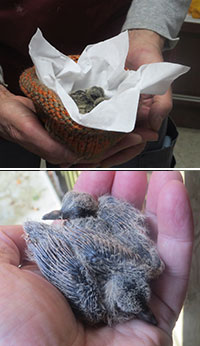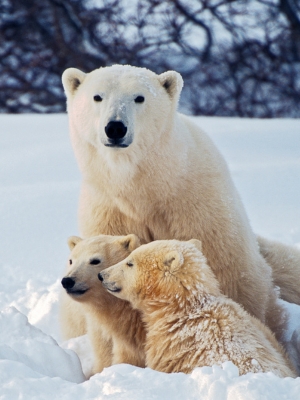
My neighbors across the street were waiting for me as I drove into my driveway. We live in a middle class residential neighborhood shared with suburban wildlife. Mourning doves had nested in my neighbors’ mulberry tree. Mourning doves, named for their mournful cooing, make terrible nests. Seriously, forget the intricate weaving of orioles, the clever use of adhesive mud by robins, the safely hidden little woven cups used by chipping sparrows, doves throw together a loose platform of twigs on which they deposit two white eggs. This nest, placed haphazardly on a broad crotch, had, even in the absence of any wind, tumbled down along with two newly hatched baby doves, one with eyes still closed. Both still had the white tip on their beaks that is called an “egg tooth,” used to break out of the egg from the inside. Their feathers were, but for a bit of wispy yellowish down, still sheathed, leaving most of their skin bare. They were much too young to maintain their core body temperature. Fortunately, it was a warm day.
We put the nest, such as it was, back up, trying to secure it with a twisty-tie. I placed the babies back in. They were about nine feet above the soft mat of garden plants that had absorbed their fall and left them unhurt. There was no sign of the parents but for a few stray feathers – perhaps an ominous suggestion of predation. Dove feathers are loosely attached, a good arrangement for escaping teeth or talons, and yet surely a predator would not have left the babies.
Just before dark, I could see no sign of parents, nor the next morning, at dawn. I had meetings to attend and, upon my return late that afternoon, there were my neighbors, waiting, with both chicks back on the ground, one on the driveway. No parents.
My childhood into early adulthood was spent in a home full of birds, since my mom was a pioneer in the practice of wildlife rehabilitation who specialized in birds. I knew what to do and mixed up a pablum-cereal formula, set up a heating pad, made a soft nest of tissues, and started feeding the birds. Doves suck from their parent’s crop an interior secretion often called “pigeon’s milk” and since that can’t be replicated, every bit of food has to be gently entered into their mouths via eye-dropper.
Were I to continue raising them, they’d become tame, and couldn’t be released. Tragically these harmless birds are now “game” birds in Ontario. Trusting people is deadly.
The solution? My partner, Sandi, and I drove them up to the Shades of Hope Wildlife Rescue rehabilitation center in Pefferlaw, where the baby birds are now receiving excellent care. They will be raised with other doves, not made tame, and so will be released with at least a chance at survival. May every hunter’s shot miss and may their parents, if alive, do better next time.
Keep Wildlife in the Wild,
Barry
 Dear Reader,
Dear Reader,